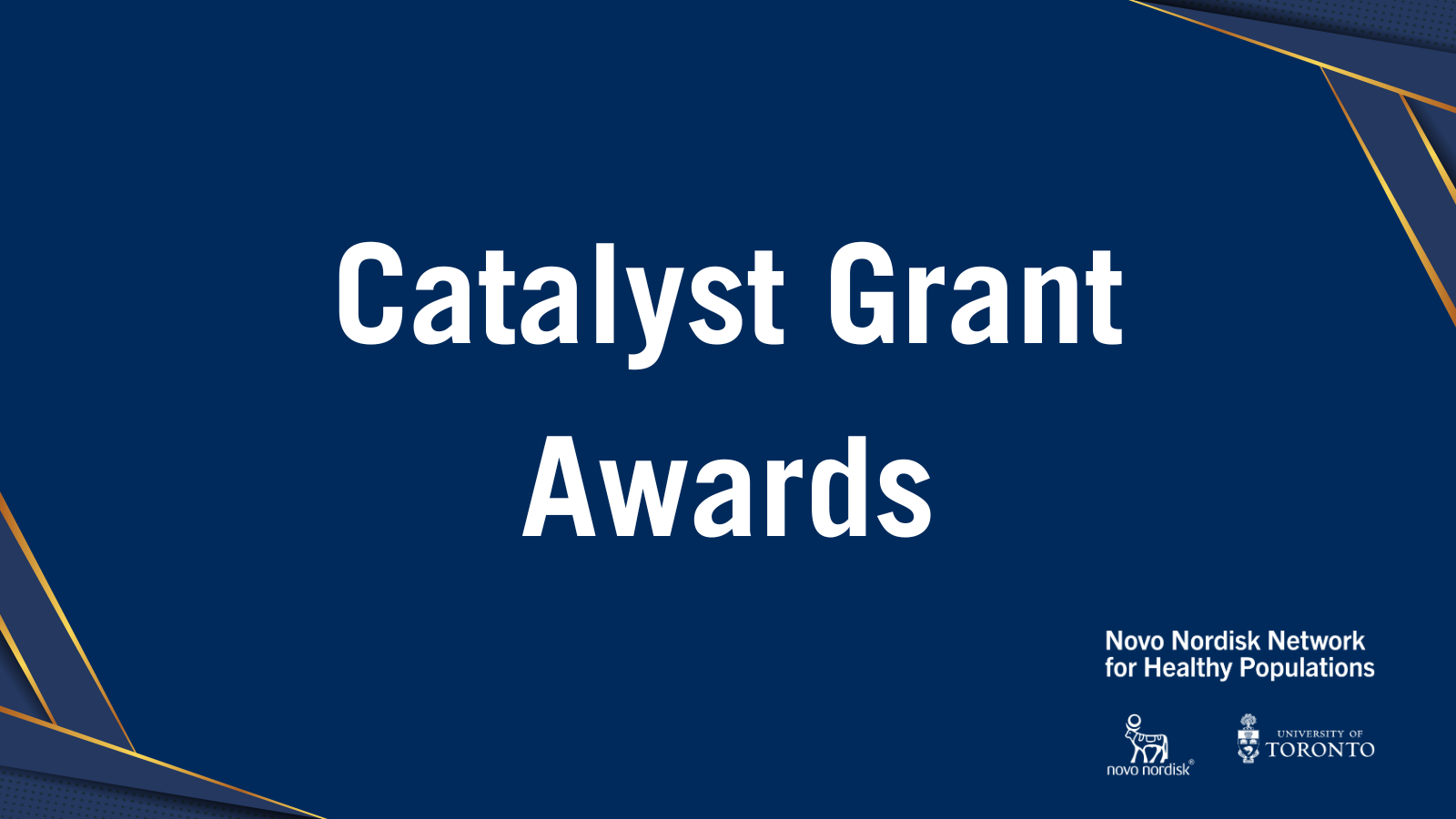
Today, the Novo Nordisk Network for Healthy Populations at the University of Toronto is announcing the winners of its 2024 Catalyst Grants. These research funding grants support projects aimed at improving health outcomes and reducing the risk of type 2 diabetes in Peel Region.
“As a Network, our goal is to support research that will lead to healthier communities,” says Dr. Lorraine Lipscombe, Director of the Network for Healthy Populations. “Each of the projects we are funding this year aims to improve the overall health of the people in Peel Region—and to reduce or remove the barriers many people in our communities face in achieving good health. We are thrilled to be able to move these projects forward, and look forward to seeing the results of their implementation.”
The Network for Healthy Populations brings together academic researchers and community partners to investigate ways to improve the overall health of a population. This includes looking at the impact of a wide variety of systems and structures, such as walkability in neighbourhoods, poverty, food insecurity, infrastructure, community services, racism and trauma. Community groups, government, policy makers and those with lived experience all help to inform the research to ensure it meets the needs of those it aims to support.
This project will engage young adults (ages 18 to 30) in Peel to identify the availability and accessibility of physical activity and healthy food resources. Through this process, the team aims to assess the environmental factors that limit/facilitate the availability and accessibility to physical activity and healthy diet behaviours of young adults in Peel. It will also explore the individual, social and structural factors that positively and negatively impact the health-promoting behaviours of young adults to reduce the risk and burden of T2D in Peel.
A collaboration with WellFort Community Health Services, The Diabetes Intake and Navigation Hub project aims to improve access to diabetes care for people with diabetes in Brampton. The goal is to make it easier for people to get the care they need by creating a central hub that helps guide people with diabetes through the healthcare system. The project aims to reduce wait times, improve access, increase collaboration and collect data that will provide a better understanding of the needs of the community to assist in planning for future diabetes care that is fair and inclusive for everyone.
With a goal of improving nutrition and food literacy, this project will map the Ontario curriculum and create educational tools using social justice frameworks. Parents, community councils, educators, students and others will be involved in determining the features of a culturally sensitive nutrition and food literacy curriculum. The team will look at the barriers to accessing food and nutrition information to improve the process and develop a more equitable curriculum.
Working in collaboration with six community partners (Punjabi Community Health Services, Indus and Roots Community Services, WellFort and LAMP Community Health Centres and Dixie-Bloor Neighbourhood Centre), this project will co-design an accessible, equitable, and sustainable diabetes screening strategy that meets the needs of the community. The project looks specifically at early detection of prediabetes and diabetes to support high-risk populations who are likely to be undiagnosed, and those who may lack access to primary care.
Working with a community team that includes researchers, community care organizations, older Black adults living with diabetes, a family caregiver and a clinician, the team will co-design and implement a culturally-tailored self-management tool that supports this community. Black adults face an increased risk of developing type 2 diabetes for a variety of reasons, this project aims to provide more targeted and effective supports to improve outcomes.
In collaboration with Seva Food Bank, this project looks to leverage Seva’s community teaching initiatives to build formal curriculums centered on nutrition education, food literacy and culinary skill development. The project focuses on teaching community members how to develop healthful meals that utilize budget-friendly, accessible and culturally-appropriate foods, in an effort to combat type 2 diabetes and mitigate its risk factors. Many seniors, newcomers and youth face accessibility and equity barriers when it comes to nutrition education and healthy eating; this project will minimize these barriers by creating curriculums targeting the greatest education needs of these demographics to support diabetes risk reduction.
To support young people in Peel Region who are struggling to find connections in a post-pandemic world, Ophea will lead a multi-sector collaborative in researching young people’s experience of belonging in relation to physical activity. Participating schools are located in high priority neighbourhoods. Many students and families experience income limitations, speak English as a second language, and are new to Canada from non-English speaking countries. Identity-affirming physical activity opportunities, that authentically reflect culture, interests, and needs, are potentially transformative for these school communities. The findings will inform the design, implementation and evaluation of future, community-driven, interventions that promote sustained and meaningful physical activity participation for young people.